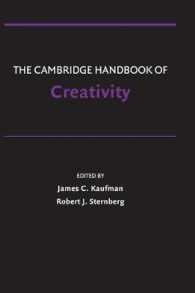- ホーム
- > 洋書
- > 英文書
- > Literary Criticism
Full Description
Tales of Dionysus is the first English verse translation of one of the most extraordinary poems of the Greek literary tradition, the Dionysiaca of Nonnus of Panopolis. By any standard, the Dionysiaca is a formidable work. It is by far the longest poem surviving from the classical world, a massive mythological epic stretching to over 20,000 lines, written in the tradition of Homer, using Homer's verse, Homer's language, his narrative turns and motifs, and invoking his ancient Muses. But it is also the last ancient epic to follow a Homeric model, composed so late in fact that it stands as close in time to the Renaissance as it does to archaic Greece. Like its titular hero, Dionysus, with his fluidity of forms, names, and divine incarnations, the poem itself is continually shifting shape. Out of its formal epic frame spills a tumult of ancient literary types: tragedy, elegy, didactic, panegyric, pastoral idyll, and the novel are all parts of this gigantic enterprise, each genre coming to the fore one after the other.
Tales of Dionysus brings together forty-two translators from a wide range of backgrounds, with different experiences and different potential relationships to the text of Nonnus' poem. All work in their own styles and with their own individual approaches to the poem, to translation, and to poetic form. This variety turns Tales of Dionysus into a showcase of the multiple possibilities open to classical translation in the contemporary world.
Contents
Contents
Editors' Preface: William Levitan and Stanley Lombardo
Acknowledgments
Introduction: Gordon Braden
Summary of the Poem
The Poem
Book 1: Douglass Parker
Book 2: Douglass Parker
Book 2 (continued): William Levitan
Book 3: Joseph Harrington
Book 4: Judith Roitman
Book 5: Rob Turner
Book 6: Brian Walters
Book 7: Christian Teresi
Book 8: Frederick Ahl
Book 9: Anne Shaw
Book 10: Michael Shaw
Book 11: Darwin Michener-Rutledge
Book 12: John L. Gronbeck-Tedesco
Book 13: Mike Lala
Book 14: Michael B. Lippman
Book 15: John L. Gronbeck-Tedesco
Book 16: Rachel Hadas
Book 17: Catherine Anderson
Book 18: Tessa Cavagnero
Book 19: Sheila H. Murnaghan
Book 20: Andrew W. Barrett
Book 21: Zachary Puckett
Book 22: Richard Jenkyns
Book 23: Anne Carson
Book 24: Gordon Braden
Book 25: Alex Dressler
Book 26: Darwin Michener-Rutledge
Book 27: Melina McClure
Book 28: Denise Low and Eileen R. Tabios
Book 29: Adrienne Atkins
Book 30: Alison R. Parker
Book 31: David Fredrick and Rachel Murray
Book 32: Joseph Harrington
Book 33: Adrienne Atkins
Book 34: Anna Mayersohn
Book 35: Maryrose Larkin
Book 36: Rebekah Curry
Book 37: Jonathan Mayhew
Book 38: Denise Low
Book 39: Anthony Corbeill
Book 40: Deborah H. Roberts
Book 41: Diane Arnson Svarlien
Book 42: Charles-Elizabeth Boyles
Book 43: Bethany Christiansen
Book 44: Tessa Cavagnero
Book 45: Anna Mayersohn
Book 46: Melina McClure
Book 47: Cyrus Console
Book 48: Stanley Lombardo
On Translating Nonnus
Notes on Contributors
Suggestions for Further Reading
Glossary of Personal Names








